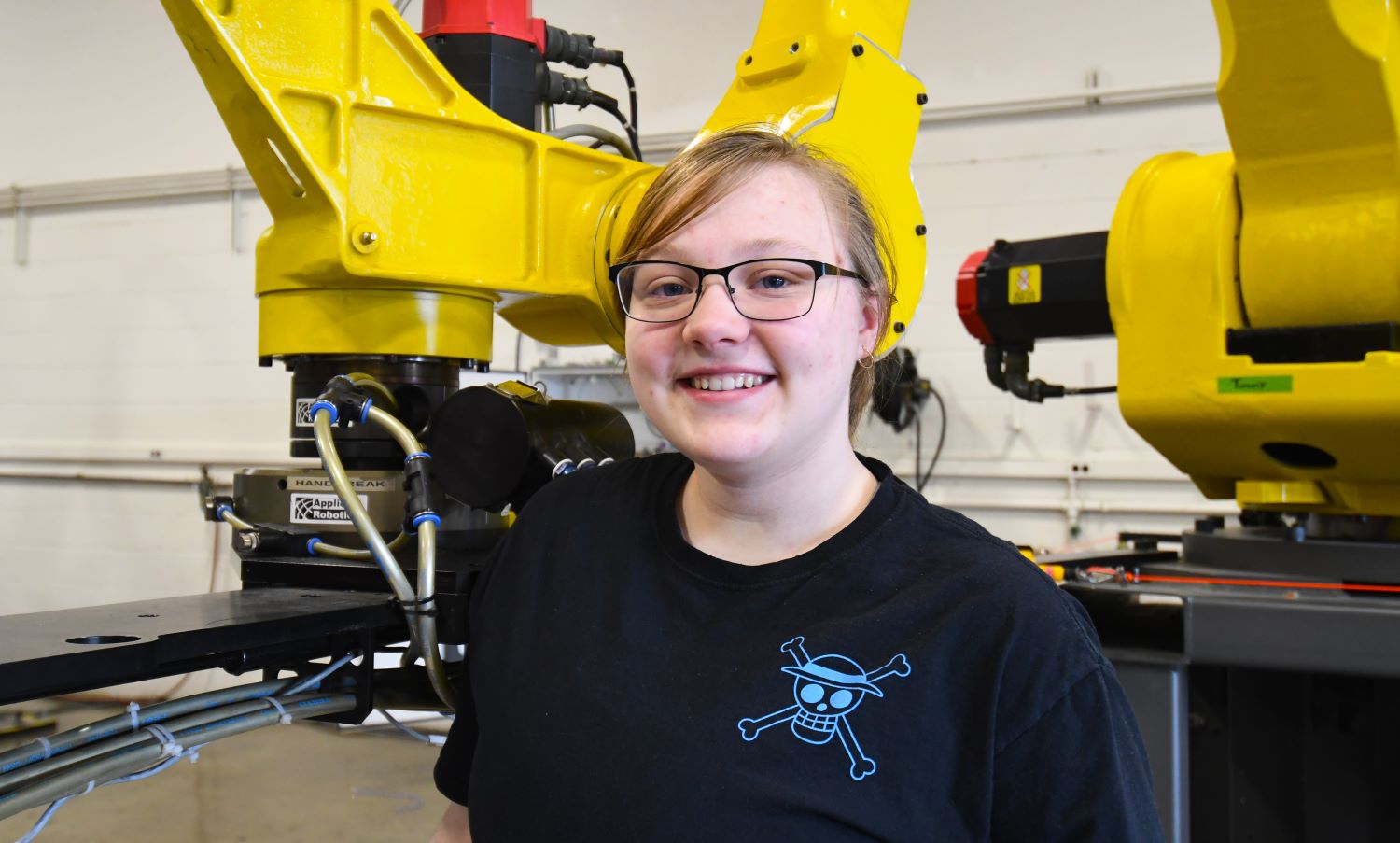Robotics / Automated Systems Technology A.A.S. Degree
Career Description
This program prepares students for careers working for systems integrators, original equipment manufacturers, and robot manufacturers. Career opportunities may also be found in the automotive, aerospace, medical, machine tool, packaging, welding, and nuclear power industries. Career titles include Robotic Automated Systems Technician, Field Servicing Technician, and Electrical Controls Technician with responsibilities in building, repairing, installing, maintaining, and programming robotics and automated systems. The A.A.S. degree also prepares students for employment advancement or other opportunities including design, engineering, or management.
Program Information
Robotic Automated Systems Technicians are an integral part of modern manufacturing companies. Technologies such as new-generation robot controllers, sensors, and electrical control systems have created a need for highly specialized training. The Robotics Automated Systems Technology Associate in Applied Science (A.A.S.) Degree prepares students for careers in the industrial robotic and automated manufacturing industry. The program has multiple robot and automation labs utilizing current technology with popular industrial robot models. The program is aligned with advisory board members, industrial partners, and industrial associations to deliver relevant content and instruction. Students are trained on the same robots, controllers, and programming languages used by manufacturing companies. The curriculum was created and is maintained by experienced technical faculty, advisory board members, and past graduates to best prepare students for employment in the industrial robotics industry. The A.A.S. Degree includes the Minnesota State Transfer Curriculum to prepare students for career advancement and articulates to other universities for additional educational awards.
Program Outcomes
Graduates will be able to:
- Identify and apply appropriate safety procedures;
- Apply knowledge and skills in electrical systems;
- Apply knowledge and skills in mechanical systems;
- Apply knowledge and skills in creating program code;
- Analyze and apply specific troubleshooting knowledge and technology in the areas of electrical, mechanical, software and program code;
- Apply effective communication and interpersonal skills as an individual and as a team member.
Special Program Requirements
In addition to the program requirements, students must meet the following conditions in order to graduate:
- College Cumulative GPA Requirement: cumulative grade point average (GPA) of credits attempted and completed at CLC must be at least 2.0;
- College Technical Core GPA Requirement: cumulative GPA of credits attempted and completed towards the technical core of the diploma or degree must be at least 2.0;
- Residency Requirement: students must complete 25% of their credits at Central Lakes College.
Transfer Opportunities
Courses in this program transfer to Minnesota State Universities (including Bemidji State University and St. Cloud State University) and North Dakota State University. This program directly articulates with programs at Minnesota State University Moorhead.
Employment Statistics
For more information regarding employment statistics, career salary information and estimated job growth, follow the resource links below:
https://apps.deed.state.mn.us/lmi/ces/
http://www.bls.gov/ooh/home.htm
Salary information from indeed.com

Program Course Requirements
Required Discipline Courses
MTTS 1264 Introduction to Machining Processes, 2 cr
RAST 1101* Industrial Electronics I, 3 cr
RAST 1102* Industrial Electronics II, 3 cr
RAST 1103* Motors and Drives, 3 cr
RAST 1104 Introduction to Automation, 2 cr
RAST 1109 Computers in Industry, 2 cr
RAST 1110 Introduction to Manufacturing, 2 cr
RAST 1111 Industrial Electronics Lab I, 2 cr
RAST 1113* Motors and Drives Lab, 3 cr
RAST 1120 Introduction to Engineering Graphics, 2 cr
RAST 1206* Programmable Logic Controllers I, 3 cr
RAST 1212* Industrial Electronics Lab II, 2 cr
RAST 2101* Application Planning & Layout, 2 cr
RAST 2105* Transducers, 2 cr
RAST 2106* Industrial Electronics III, 2 cr
RAST 2116* Industrial Electronics Lab III, 2 cr
RAST 2132* Robotic Programming, 3 cr
RAST 2151* Robotic Integration Lab, 6 cr
RAST 2154* Robot Controller Maintenance, 2 cr
RAST 2165* Fluid Power, 2 cr
RAST 2355* Programmable Logic Controllers II, 2 cr
RAST 2395* Advanced Robot Controller Programming, 2 cr
RAST 2390* Robotics Internship OR
RAST 2399* Independent Study, 1-3 cr
Required MnTC Courses
MATH 1470 College Algebra (Goal 4), 3 cr
Additional Minnesota Transfer Curriculum courses, 12 cr
An A.A.S. degree requires a minimum of 15 credits selected from at least three of the ten goal areas of the Minnesota Transfer Curriculum (MnTC).
*Denotes Prerequisites
GRADUATION REQUIREMENT – 70 CREDITS
Program Instructors
| Photo | First Name | Last Name | Position | Department | Phone | Alt. Phone: | URL | wdt_ID | Details | |
|---|---|---|---|---|---|---|---|---|---|---|
 |
Aubrey | Beadell | Advisor | TRIOStudentSupportServices | (218) 855-8014 | aubrey.beadell@clcmn.edu | 1 | More details | ||
 |
Nick | O'Reilly | Occupational Skills Program College Lab Assistant | OccupationalSkills | 218-855-8077 | Nicholas.oreilly@clcmn.edu | 2 | More details | ||
 |
Kevin | Lomax | College Lab Assistant | Automotive Faculty | 218-855-8000 | KLomax@clcmn.edu | 3 | More details | ||
 |
Jody | Flynn | Accessibility Services Assistant | Accessibility | 218-855-8056 | jody.flynn@clcmn.edu | 5 | More details | ||
 |
Deana | Bobzien | Instructor | CollegeCareerStudies - Mathematics - Supportive Services | 218-855-8339 | deana.bobzien@clcmn.edu | 7 | More details | ||
 |
Brianna | Rajkowski | Advisor | TRIOStudentSupportServices | 218-855-8228 | brianna.rajkowski@clcmn.edu | 8 | More details | ||
 |
Cynthia | Dionysius | AD Nursing Faculty | NursingASDegree | 218-855-8133 | cindy.dionysius@clcmn.edu | 9 | More details | ||
 |
Tajia | Anderson | PSEO Specialist | Admissions - CollegeCreditInHighSchool- PSEO | (218) 855-8079 | tajia.anderson@clcmn.edu | 10 | More details | ||
 |
David | Gray | Instructor | History | 218-855-8276 | david.gray@clcmn.edu | 14 | More details | ||
 |
Jim | Nagy | Adjunct Instructor | GraphicDesign | 218-855-8157 | james.nagy@clcmn.edu | 15 | More details | ||
 |
Brandon | Schneider | Instructor | HeavyEquipment | 218-894-5179 | brandon.schneider@clcmn.edu | 16 | More details | ||
 |
Natalia | DePauw | Director of Dual Enrollment | Advising - PSEO - CollegeCreditInHighSchool | 218-855-8263 | natalia.depauw@clcmn.edu | 18 | More details | ||
| Amy | Disterhaupt | Admissions Specialist | Admissions | 218-855-8250 | amy.disterhaupt@clcmn.edu | 20 | More details | |||
 |
Nick | Heisserer | Dean of Brainerd Career & Technical Programs | Administration | 218-855-8067 | nick.heisserer@clcmn.edu | 21 | More details | ||
 |
Matthew | Krueger | Environmental Health and Safety Officer | Maintenance - Security - Safety | 218-855-8115 | matthew.krueger@clcmn.edu | 22 | More details | ||
 |
Mark | Lindquist | Instructor | Music | 218-855-8203 | mark.lindquist@clcmn.edu | 23 | More details | ||
 |
Jeremy | Goddard | Bookstore/Print Shop | Bookstore Supportive Services | 218-855-8146 | Jeremy.Goddard@clcmn.edu | 25 | More details | ||
 |
Sarah | Jennissen | Instsructor | NursingAssistant - PracticalNursing - TrainedMedicationAid | 218-894-5308 | sarah.jennissen@clcmn.edu | 26 | More details | ||
 |
Cash | Robinson | Academic Advisor | TRIOUpwardBound - Advising | 218-855-8035 | cash.robinson@clcmn.edu | 28 | More details | ||
 |
Ryan | Wright | Enrollment Representative | Admissions - CampusTours | 218-855-8013 | ryan.wright@clcmn.edu | 31 | More details | ||
 |
Steve | Wenzel | Instructor | PoliticalScience | 218-855-8073 | stephen.wenzel@clcmn.edu | 32 | More details | ||
 |
Julie | Woitalla | Instructor | NursingASDegree - PracticalNursing | 218-855-8168 | julie.woitalla@clcmn.edu | 33 | More details | ||
 |
Josh | Zaborowski | Upward Bound Advisor | TRIOUpwardBound - Assessment | 218-855-8032 | joshua.zaborowski@clcmn.edu | 35 | More details | ||
 |
Paul | Zimmerman | Instructor | Diesel Faculty | 218-894-5143 | paul.zimmerman@clcmn.edu | 36 | More details | ||
 |
Ed | Uhlenkamp | Instructor | FarmBusinessManagement | 218-894-5160 | edward.uhlenkamp@clcmn.edu | https://dynamicforms.ngwebsolutions.com/ShowForm.aspx?RequestedDynamicFormTemplate=32c40b45-028c-46d6-9f79-9c1edc503713 | 38 | More details |
Photo:
First Name:
Last Name:
Position:
Phone:
Email:
